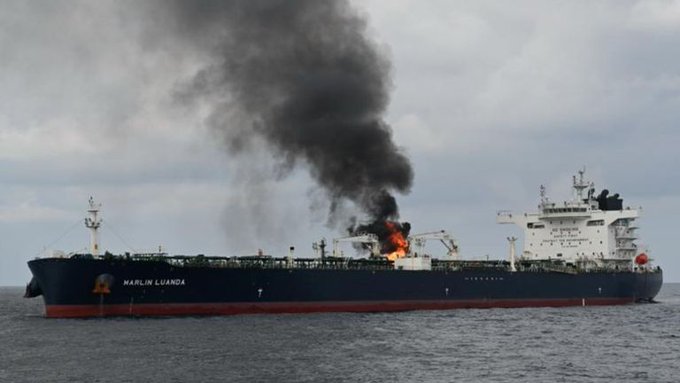Houthi Missile Attack Sets British Oil Tanker Ablaze in Gulf of Aden; Global Shipping Routes Impacted
The British oil tanker Marlin Luanda fell victim to a missile attack orchestrated by Yemen’s Houthi rebels, marking a significant escalation in regional tensions. The attack resulted in a fire engulfing the vessel, prompting an immediate and intensive response from Trafigura, the multinational company responsible for managing the tanker. With assistance from Indian, US, and French Navy vessels, the firefighting efforts were ultimately successful in extinguishing the blaze in one of the cargo tanks.

The Houthi rebels wasted no time in claiming responsibility for the attack, citing their motivation as a response to what they termed “American-British aggression against our country [Yemen]” while also expressing solidarity with the Palestinian people. This attack follows recent joint strikes by the United States and the United Kingdom against Houthi targets, undertaken in response to disruptions in the international shipping lane, further intensifying the already volatile situation in the region.
Military ships from India, the US, and France are now en route to provide additional support to the affected vessel. Thankfully, no injuries have been reported among the crew, bringing a glimmer of relief in the midst of heightened tensions.
The incident raises concerns about the safety of vessels navigating through one of the world’s busiest shipping lanes, with major shipping and oil companies opting to suspend transit through the Gulf of Aden. This disruption forces vessels to take alternate routes around the continent of Africa, causing significant delays and economic repercussions.
The ongoing conflict in Yemen between Houthi forces and a Saudi-backed coalition has already led to a severe humanitarian crisis, characterized by famine, economic turmoil, and extreme poverty. The situation further deteriorated when Houthi forces stormed the capital, Sanaa, in 2014, toppling the internationally recognized and Saudi-backed government, triggering a devastating civil war. Since 2015, a Saudi-led coalition has intervened in an attempt to curb Houthi advances, resulting in a conflict that has claimed up to 377,000 lives, according to a 2021 report by the United Nations Development Programme (UNDP).
The Houthi rebels, seen as a proxy of Iran, continue to target vessels in the Red Sea region, exploiting the tensions in the area without directly confronting major naval powers. The attack on Marlin Luanda comes as part of a series of Houthi assaults on commercial shipping, further complicating an already intricate regional landscape.
The UK government swiftly condemned the attacks as “completely unacceptable,” asserting the right to respond appropriately to safeguard international shipping interests. Meanwhile, the US Central Command, on top of rendering assistance to the affected vessel, conducted a defensive strike against a Houthi anti-ship missile aimed into the Red Sea.
This marks the first reported instance of the Houthis targeting a US military vessel rather than a commercial one. The vessel is now on its way to a safe harbor, providing a momentary respite in what appears to be an ongoing and deeply complex series of events in the Gulf of Aden







